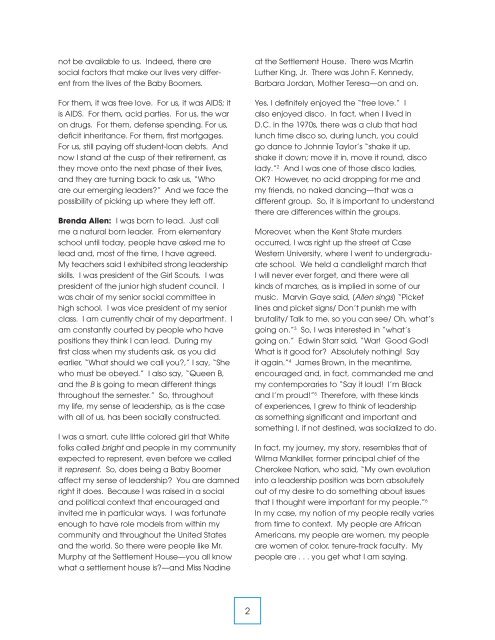The New Face of Arts Leadership in the West - westaf - The Western ...
The New Face of Arts Leadership in the West - westaf - The Western ...
The New Face of Arts Leadership in the West - westaf - The Western ...
Create successful ePaper yourself
Turn your PDF publications into a flip-book with our unique Google optimized e-Paper software.
not be available to us. Indeed, <strong>the</strong>re are<br />
social factors that make our lives very different<br />
from <strong>the</strong> lives <strong>of</strong> <strong>the</strong> Baby Boomers.<br />
For <strong>the</strong>m, it was free love. For us, it was AIDS; it<br />
is AIDS. For <strong>the</strong>m, acid parties. For us, <strong>the</strong> war<br />
on drugs. For <strong>the</strong>m, defense spend<strong>in</strong>g. For us,<br />
deficit <strong>in</strong>heritance. For <strong>the</strong>m, first mortgages.<br />
For us, still pay<strong>in</strong>g <strong>of</strong>f student-loan debts. And<br />
now I stand at <strong>the</strong> cusp <strong>of</strong> <strong>the</strong>ir retirement, as<br />
<strong>the</strong>y move onto <strong>the</strong> next phase <strong>of</strong> <strong>the</strong>ir lives,<br />
and <strong>the</strong>y are turn<strong>in</strong>g back to ask us, “Who<br />
are our emerg<strong>in</strong>g leaders?” And we face <strong>the</strong><br />
possibility <strong>of</strong> pick<strong>in</strong>g up where <strong>the</strong>y left <strong>of</strong>f.<br />
Brenda Allen: I was born to lead. Just call<br />
me a natural born leader. From elementary<br />
school until today, people have asked me to<br />
lead and, most <strong>of</strong> <strong>the</strong> time, I have agreed.<br />
My teachers said I exhibited strong leadership<br />
skills. I was president <strong>of</strong> <strong>the</strong> Girl Scouts. I was<br />
president <strong>of</strong> <strong>the</strong> junior high student council. I<br />
was chair <strong>of</strong> my senior social committee <strong>in</strong><br />
high school. I was vice president <strong>of</strong> my senior<br />
class. I am currently chair <strong>of</strong> my department. I<br />
am constantly courted by people who have<br />
positions <strong>the</strong>y th<strong>in</strong>k I can lead. Dur<strong>in</strong>g my<br />
first class when my students ask, as you did<br />
earlier, “What should we call you?,” I say, “She<br />
who must be obeyed.” I also say, “Queen B,<br />
and <strong>the</strong> B is go<strong>in</strong>g to mean different th<strong>in</strong>gs<br />
throughout <strong>the</strong> semester.” So, throughout<br />
my life, my sense <strong>of</strong> leadership, as is <strong>the</strong> case<br />
with all <strong>of</strong> us, has been socially constructed.<br />
I was a smart, cute little colored girl that White<br />
folks called bright and people <strong>in</strong> my community<br />
expected to represent, even before we called<br />
it represent. So, does be<strong>in</strong>g a Baby Boomer<br />
affect my sense <strong>of</strong> leadership? You are damned<br />
right it does. Because I was raised <strong>in</strong> a social<br />
and political context that encouraged and<br />
<strong>in</strong>vited me <strong>in</strong> particular ways. I was fortunate<br />
enough to have role models from with<strong>in</strong> my<br />
community and throughout <strong>the</strong> United States<br />
and <strong>the</strong> world. So <strong>the</strong>re were people like Mr.<br />
Murphy at <strong>the</strong> Settlement House—you all know<br />
what a settlement house is?—and Miss Nad<strong>in</strong>e<br />
at <strong>the</strong> Settlement House. <strong>The</strong>re was Mart<strong>in</strong><br />
Lu<strong>the</strong>r K<strong>in</strong>g, Jr. <strong>The</strong>re was John F. Kennedy,<br />
Barbara Jordan, Mo<strong>the</strong>r Teresa—on and on.<br />
Yes, I def<strong>in</strong>itely enjoyed <strong>the</strong> “free love.” I<br />
also enjoyed disco. In fact, when I lived <strong>in</strong><br />
D.C. <strong>in</strong> <strong>the</strong> 1970s, <strong>the</strong>re was a club that had<br />
lunch time disco so, dur<strong>in</strong>g lunch, you could<br />
go dance to Johnnie Taylor’s “shake it up,<br />
shake it down; move it <strong>in</strong>, move it round, disco<br />
lady.” 2 And I was one <strong>of</strong> those disco ladies,<br />
OK? However, no acid dropp<strong>in</strong>g for me and<br />
my friends, no naked danc<strong>in</strong>g—that was a<br />
different group. So, it is important to understand<br />
<strong>the</strong>re are differences with<strong>in</strong> <strong>the</strong> groups.<br />
Moreover, when <strong>the</strong> Kent State murders<br />
occurred, I was right up <strong>the</strong> street at Case<br />
<strong>West</strong>ern University, where I went to undergraduate<br />
school. We held a candlelight march that<br />
I will never ever forget, and <strong>the</strong>re were all<br />
k<strong>in</strong>ds <strong>of</strong> marches, as is implied <strong>in</strong> some <strong>of</strong> our<br />
music. Marv<strong>in</strong> Gaye said, [Allen s<strong>in</strong>gs] “Picket<br />
l<strong>in</strong>es and picket signs/ Don’t punish me with<br />
brutality/ Talk to me, so you can see/ Oh, what’s<br />
go<strong>in</strong>g on.” 3 So, I was <strong>in</strong>terested <strong>in</strong> “what’s<br />
go<strong>in</strong>g on.” Edw<strong>in</strong> Starr said, “War! Good God!<br />
What is it good for? Absolutely noth<strong>in</strong>g! Say<br />
it aga<strong>in</strong>.” 4 James Brown, <strong>in</strong> <strong>the</strong> meantime,<br />
encouraged and, <strong>in</strong> fact, commanded me and<br />
my contemporaries to “Say it loud! I’m Black<br />
and I’m proud!” 5 <strong>The</strong>refore, with <strong>the</strong>se k<strong>in</strong>ds<br />
<strong>of</strong> experiences, I grew to th<strong>in</strong>k <strong>of</strong> leadership<br />
as someth<strong>in</strong>g significant and important and<br />
someth<strong>in</strong>g I, if not dest<strong>in</strong>ed, was socialized to do.<br />
In fact, my journey, my story, resembles that <strong>of</strong><br />
Wilma Mankiller, former pr<strong>in</strong>cipal chief <strong>of</strong> <strong>the</strong><br />
Cherokee Nation, who said, “My own evolution<br />
<strong>in</strong>to a leadership position was born absolutely<br />
out <strong>of</strong> my desire to do someth<strong>in</strong>g about issues<br />
that I thought were important for my people.” 6<br />
In my case, my notion <strong>of</strong> my people really varies<br />
from time to context. My people are African<br />
Americans, my people are women, my people<br />
are women <strong>of</strong> color, tenure-track faculty. My<br />
people are . . . you get what I am say<strong>in</strong>g.<br />
2


